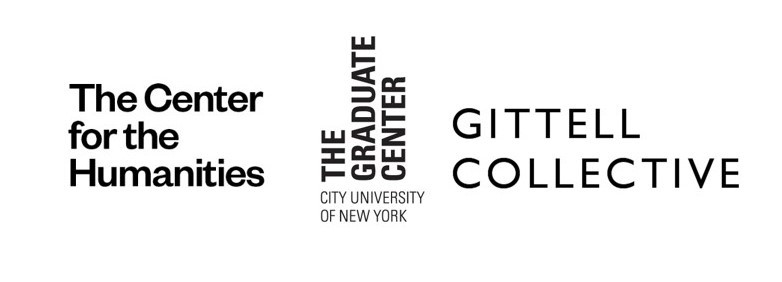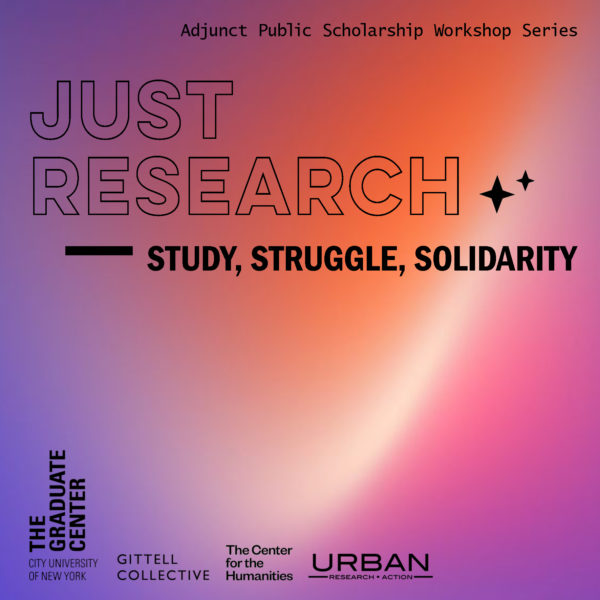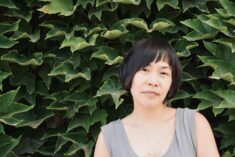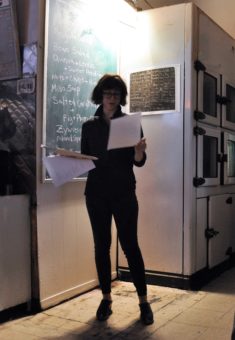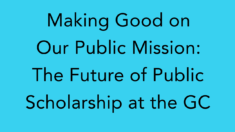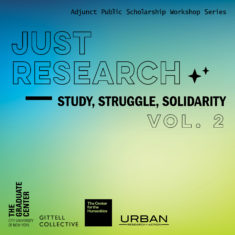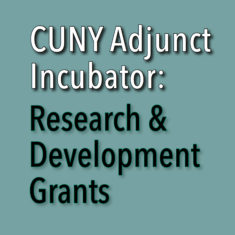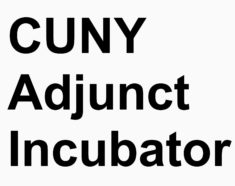About this Adjunct Public Scholarship Workshop Series
"Just Research: Study, Struggle, Solidarity" is a short workshop series on conducting public scholarship and democratizing the production of knowledge. The workshop will take place over 5 weeks, provides $500 as an honorarium upon completion, and is specifically tailored for adjunct instructors in the humanities and humanistic social sciences.
This workshop series aims to help CUNY Adjuncts to advance research projects (including but not limited to dissertations) that draw upon some aspect of Community-Based Research and related methodologies, such as Participatory Action Research, Appreciative or Asset-Based Inquiry, Collaborative Inquiry, and Practice-Based Research. Such research tackles community problems, with the aim of combining knowledge and action for policy or social change.
The workshop series will focus on:
1) skills and strategies for participating effectively in such research,
2) navigating issues of rigor and validity in such work,
3) developing appropriate research strategies and outlines of presentations/ articles/ chapters for dissemination, andbuilding structures of support and room for reflexive work along the way.
4) building structures of support and room for reflexive work along the way.
Throughout the series, we will also prioritize our meetings as opportunities to broach typically overlooked or sensitive topics, to share concerns or reservations as well as aspirations related to our work, to support one another and make real progress on our respective projects, and to collectively share insights on negotiating academic milestones, disciplinary boundaries, and austerity in collaborative research.
This course aims to facilitate multi-disciplinary dialogues on theories and principles of community-based research (with special attention to race, gender, and class dimensions), the strengths and limitations of such approaches, and guiding practices and case studies/ models for successful research projects. We have designed this series to support and strengthen the significant scholarly, creative, and pedagogical work of adjuncts teaching in the humanities and humanistic social sciences across CUNY.
Eligibility:
This workshop is designed for CUNY-affiliated adjuncts/ researchers, who have already formulated at least an idea for a research project. We aim to think through and reflect upon research projects that center on the complexity of real-life sociopolitical contexts and struggles, and implications and impact upon people on the ground (alongside theoretical models and debates in academic literatures).
This semester, we are only inviting previous applicants to the CUNY Adjunct Incubator program to apply to participate in this workshop series. Adjuncts who applied to the CUNY Adjunct Incubator program are encouraged to apply, regardless of whether their applications were successful and received funding. We plan on limiting the number of spots available, so that we will have sufficient time during our meetings to discuss each workshop participant’s project. We hope to expand upon this series to develop further opportunities in the future.
Application deadline:
February 3rd, 2021, by 11:59 PM.
How to Apply:
To apply, please click here to fill out the application form.
Stipend:
At this time, we are able to provide a $500 honorarium for each participant upon completion of the workshop series.
*For CUNY Students: Before applying, please contact the office of financial aid at your campus to ensure that you are eligible to receive this funding without it adversely impacting your existing financial aid package. In your email to them, please include the fellowship amount, the semester you would receive it, and your EMPL ID, which you can find in CUNYFirst under Student Center.
Time commitment:
This workshop series is designed to require 4-5 hours of participation each week, comprising of roughly 2-3 hours of preparatory work and a 1.5-hour meeting each week.
Tentative schedule:
Fridays, 3:00-4:30 pm
Dates: 2/26, 3/5, 3/12, 3/19, and 3/26
How and why did we develop this workshop series?
This workshop series builds upon the success of the CUNY Adjunct
Incubator, a collaborative effort between the Gittell Collective and
Center for the Humanities Mellon Foundation-funded Seminar on Public
Engagement and Collaborative Research. The Adjunct Incubator
project advocates to improve the material conditions of university life
and make them more equitable for adjuncts, by supporting the significant
scholarly, creative, and pedagogical work of adjuncts teaching in the
humanities and humanistic social sciences
across CUNY. Providing social, logistical, financial, and professional
support for the creation and circulation of knowledge by CUNY adjuncts,
this platform promotes the crucial work of part-time faculty across the
CUNY community and senior college campuses.
We were struck by the immense interest in urgent, action-oriented public
scholarship among adjunct instructors throughout the CUNY campuses--
including and especially among researchers formally housed in the
humanities, alongside those in the social sciences.
We developed this workshop series after noting the dearth of courses
that emphasize (or even mention) participatory methods and methodologies
in social research and the public humanities at the CUNY Graduate
Center. Of particular importance is the centrality
of ethics and the obligations of public university in anti-racist
solidarities and public scholarship.
The workshop series title is inspired in part by Michelle Fine’s book,
Just Research in Contentious Times (Teachers College Press, 2017). It
will be led by Professor Celina Su (Environmental Psychology and Urban
Education, director of the Gittell Collective,
CUNY) and Kendra Sullivan (Associate Director, Center for the
Humanities, CUNY Graduate Center). It was also conceived to potentially
become part of a modular seminar series led by Dr. Su, Dr. Michelle Fine
(Environmental Psychology, Co-Director of the Public
Science Project, CUNY), and Dr. María Torre (Co-Director of the Public
Science Project).
What will the workshop series tackle and cover?
Over the past few decades, the involvement of community members in research has emerged as both an explicit goal and a practice in a range of disciplines and fields independently— in education, political science, sociology, anthropology, public policy, public health, arts and design, and development studies (especially international development), among others. It is related to and sometimes alternately called Participatory Action Research (PAR), action research, and critical praxis. Although some researchers characterize community-based participatory research (CBPR) as a set of methods (alongside surveys, interviews, mapping, PhotoVoice, observation, ethnography, etc.), we will focus primarily on PAR as an epistemological standpoint, with a set of questions that spans across disciplines. Such an approach explicitly challenges positivist assumptions that universal, stable, ahistorical scientific criteria, data, and truths exist, and that these truths can be best “discovered” through laboratory settings and experimental designs in the social sciences, or through universal criteria for what becomes canonical in the arts. It compels us (researchers who work in the academy) to confront power dynamics in the research process, make our interpretivist approaches legible and explicit, and prioritize community needs alongside institutional, academic ones.
Rather than focusing on specific sets of methods, we will grapple with tensions that arise in projects aimed at producing both “academic” and “actionable” knowledge, with the goal of helping each workshop participant’s research project to make tangible progress. (We will provide resources for participants to get a quick but solid grasp on appropriate methods, if needed.) How should we collaborate with communities in meaningful ways, and co-produce “useful” outputs and knowledge? How do we engage in research that simultaneously critically examines the phenomenon at hand, and reflects commitment to larger social struggles? How do we navigate the logistical, political, and epistemological processes (both in the field and in our academic institutions)? Who owns this data, this knowledge?
++++++
Just Research Syllabus:
Below please find additional information on the weekly workshops in the series. Each workshop session is designed to both question dominant, extractive and colonizing modes of research fieldwork, and ideally, to help participants to enact alternatives, producing useful tools or pieces of participatory research puzzles along the way: a research design outline or methods section, a memorandum of understanding, etc.
(As of January 13, 2021, exact readings and links may be subject to a bit of change.)
1. Unpacking the roots and uses of “participation” in research
Guiding question: Why pursue participatory research, and substantively work with community folks from outside the academy in our scholarship?
Readings:
1) Wallerstein, N and Duran, B. 2008. The theoretical, historical & practice roots of CBPR. In Minkler, M and Wallerstein, N, eds., Community Based Participatory Research for Health: From Process to Outcomes. Chapter 2, pp. 25-40. [See Minkler Wallerstein PDF.]
2) Cornwall, Andrea. 2008. Unpacking ‘Participation’: Models, Meanings, and Practice. Community Development Journal, 43:3, pp. 269–283.
3) Appadurai, A. 2006. The Right to Research. Globalisation, Societies and Education, 4:2, pp. 167-177.
4) Warner, Michael. 2002. Publics and Counterpublics (abbreviated version).
5) Mbembe, Achille. 2020. The Universal Right to Breathe.
6) In addition to readings, explore toolkits:
- Community Development Project, Urban Justice Center Research for Organizing Toolkit: http://www.researchfororganizing.org/about-this-toolkit/
- Public Science Project matrix on Participatory Action Research: https://actionresearch.mit.edu/sites/default/files/documents/PAR-Map.pdf
DUE: one-page summary/notes on research project and goals for the workshops. Depending on how far along you are in your project, try to give us either your research puzzle or the different iterations of your “so-what” takeaways
IN SESSION: Case readings exercise
2. Articulating methodologies: Participatory methods and positionality statements
Guiding questions: How do we go about this? How do we select specific methods that help us to connect relevant theories and research questions to communities on the ground, and what we are ultimately interested in learning about? How do we articulate our positionalities using these methods?
Readings:
1) Stoecker, R. 1999. Are academics irrelevant? Approaches and roles for scholars in Community-Based Participatory Research. American Behavioral Scientist, pp. 840-854.
2) Saltmarsh, Hartley, Clayton. 2009. Democratic Engagement White Paper.
3) Pulido, L. FAQs: Frequently (Un)Asked Questions about Being a Scholar Activist, pp. 341-365, in Hale, Charles, ed., Engaging Contradictions. [See pp. 370-394 of Hale PDF.]
4) Cairns, K. 2011. Ethnographic locations, Chapter 3 of dissertation.
5) Corburn, J. 2007. The Mapping of Local Knowledge. Street Science: Environmental and Community Health Justice, pp. 173-199.
6) Combahee River Collective Statement. 1977.
7) Primers on notions of validity: https://conjointly.com/kb/introduction-to-validity/ and https://conjointly.com/kb/qualitative-validity/
IN SESSION: Making decisions on participatory methods:
- Guidelines for Qualitative Research: http://www.qualres.org/HomeGuid-3868.html and http://www.qualres.org/HomeComm-3597.html
3. Navigating ethical dilemmas in participatory research : Institutional Review Boards (IRBs) and Memoranda Of Understanding (MOUs)
Guiding questions: What ethical dilemmas can we anticipate and prepare to navigate along the way, as best we can? How do we address tensions regarding power inequalities and our university/ institutional constraints?
Readings:
1) Minkler, M. 2004. Ethical challenges for the “outside” researcher in community-based participatory research. Health Education & Behavior, 31:7, pp. 684-697.
2) Coy, M. 2006. This morning I’m a researcher, this afternoon I’m an outreach worker: Ethical dilemmas in practitioner research. International Journal of Social Research Methodology: Theory & Practice, 9:5, pp. 419-431.
3) Fine, M. & Torre, M.E. 2006. Intimate details: Participatory action research in prison. Action Research, 4:3, pp. 253-269.
4) Noorani et al, 2017. “Participatory research and the medicalization of research ethics processes.” Social & Legal Studies, 26:3, pp. 378-400.
5) In addition to readings, to explore:
IN SESSION: Discussion of MOUs
4. Emphasizing action: Impact validity, collective struggle, and policy change
Guiding question: How do we design our research and structure our sharings to amplify impact, to align with movement/ campaign timelines and priorities, and to prompt action?
Readings:
1) Sandwick, T., et al. 2018. Promise and Provocation: Humble Reflections on Critical Participatory Action Research for Social Policy. [See “Special URBAN issue” PDF, pp. 37-66 of PDF.]
2) Wyly, E. 2009. Strategic positivism. Professional Geographer, 61: pp. 310-322.
3) Massey et al. 2013. Introducing Impact validity.” Journal of Social Issues, 69,4, pp. 615-632.
4) Kelley, R, et al. 2016. Black Study, Black Struggle. Forum in the Boston Review.
IN SESSION: Discussion of individual projects
5. Reflecting on analyses and sharing our research : Plans of dissemination
Guiding questions: How do we disseminate our findings? What sorts of multiple products and multiple audiences do we wish to prioritize and focus on, both within and outside of academia?
Readings:
1) Neale, J. 2008. Ranting and silence: Contradictions of Writing for Activists and Academics, in Heidi Armbruster & Anna Lærke, eds., Taking Sides: Ethics, Politics, and Fieldwork in Anthropology. Berghahn Books.
2) Davis, D. and C. Craven. 2016. Feminist Ethnography, Chapter 6, pp. 121-143.
3) Chen, K. 2016. Navigating the descent: Getting ethnographic research into print. Draft shared with permission.
4) In addition to readings, explore Humanities for All projects:
IN SESSION: Discussion of Humanities for All (especially Angeles Donoso Macaya’s work)
This workshop series is organized and co-sponsored by the Gittell Collective and Center for the Humanities Mellon Foundation-funded Seminar on Public Engagement and Collaborative Research, and the Urban Research Network.
